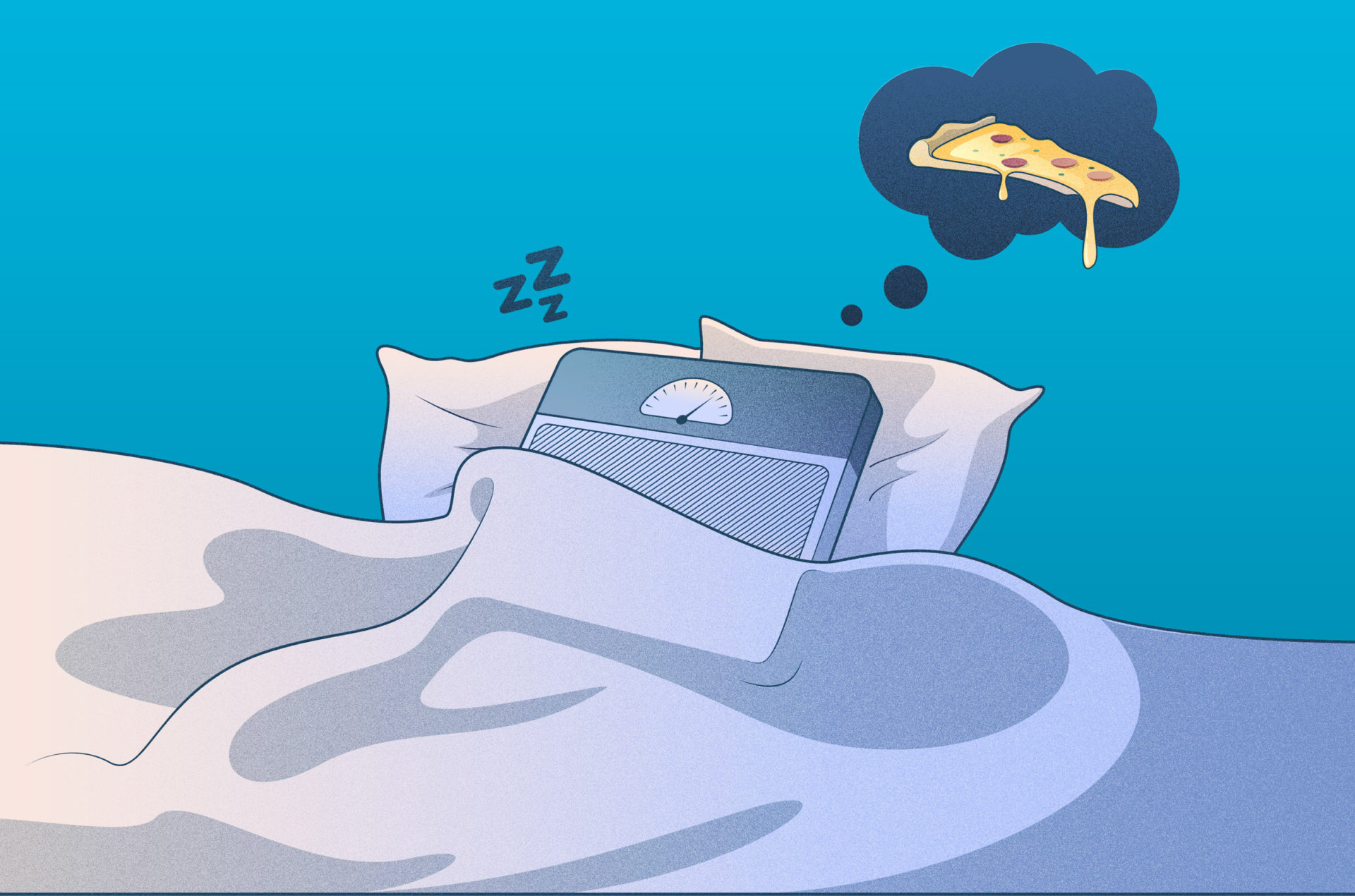Reducing body fat is a pleasureless task for most, with a study showing 49.1% of U.S adults actively are trying to lose weight. Among these adults, the most commonly reported method to lose weight was through exercise and restricting calories, followed by eating more fruit and vegetables.
As essential as it is to take these steps for weight control, one important component often gets overlooked: Paying attention to sleep could be the game-changer to help control undesirable belly fat and body fat in general. We dig deeper into why sleep matters for weight control and 7 ways sleep and weight loss are connected.
In this article, we’ll cover:
How can you lose belly fat?
If your goal is to reduce belly fat, you may be tempted to focus on doing specific exercises, such as crunches and ab workouts. However, spot-reducing fat loss in a specific area is not how weight loss works. In fact, you cannot choose where you lose fat in your body. Moreover, research has shown that doing ab workouts alone will not significantly reduce belly fat, only improve your muscular endurance.
Rather than relying on quick fixes that promise fast weight loss and a flat belly, it’s important to focus on healthy lifestyle practices that promote good physical and mental health. This includes sleep and a good night’s rest.
The link between sleep and weight loss / gain
When we’re short on sleep or sleep-deprived, it can have widespread effects, affecting our mood, memory and health and leading to poor judgment (late-night snacking comes to mind), causing lack of energy while cravings for sweet, salty and starchy foods increase.
In many epidemiological studies, being overweight has been linked to sleep deprivation. As mentioned above, many of these studies show how sleep affects our behavior which often leads to poor choices, however, there’s also growing research that argues that sleep also has a biological effect directly impacting our weight. The Centers for Disease Control and Prevention (CDC) have estimated that more than 35% of US adults get less than 7 hours (the recommended amount) of sleep per night. Yet managing their sleep could be the secret weapon to managing their weight.
Does eating before bed cause weight gain?
It is important to note that weight gain is determined by a variety of factors, including overall calorie intake, physical activity, sleep and genetics.
While light is the main factor that impacts our circadian rhythm, the timing of our meals also matter and may have an effect on our metabolic processes. In other words, eating late at night can disrupt our circadian rhythms, leading to increased belly fat and risk of obesity over time.
Studies have shown that shifting our calorie intake and meal timings earlier in the day may help us lose weight, as our bodies are better equipped to process food during the day. It’s recommended to eat dinner at least two to three hours before bedtime to maintain a healthy synchronization of our body clocks and avoid potential disruptions to our sleep, which can also contribute to weight gain (as we will see below).
How sleep can help you lose belly fat overnight: 7 facts
There is a well-established link between sleep and weight loss (or gain). Getting the sleep you need is the most essential factor in maintaining a healthy weight and avoiding related health problems. Let’s dig into 7 facts that prove this connection:
1. Hormones released during sleep
Leptin and ghrelin are two hormones that have a significant effect on energy balance and appetite regulation. Reduced leptin and elevated ghrelin have been reported in large population samples with sleep deprivation as well as an increased Body Mass Index (BMI). The changes in these hormones after shorter sleep durations are likely to increase appetite and could also be a possible explanation for the increased BMI.
2. Sufficient sleep can still cravings
Certain foods are more attractive when you’re sleep-deprived. A study carried out in two groups, one sleep-deprived, and the other rested, found that sleep deprivation resulted in a significant increase in the proportion of ‘desirable’ foods carrying high-caloric content. Yet in contrast, there was no difference between the two groups for low-calorie items. Essentially, starchy carbohydrates, fatty and salty foods – all a recipe for weight gain were more attractive to the sleep-deprived brain
3. Boosts energy for exercise
You know the days, when it feels impossible to get off the couch, let alone getting your trainers on and heading to the gym. Now backtrack and make a mental note of how you slept the night before. Chances are, not very well. When your body is in deep sleep or slow-wave sleep, it also repairs itself. This stage of sleep is linked to your levels of energy and the body’s ability to make ATP (the body’s energy molecule). The deep stage of sleep also stimulates muscle repair and tissue growth whilst activating the body’s immune system. More research is needed to explore the link between sleep deprivation and physical performance, but existing studies suggest that sleep deprivation can reduce the time it takes to reach exhaustion.
4. Reduces window for extra snacking
The math can also be simplified, sleeping for longer hours in a day leaves less room (and hours) for snacking. If you tend to stay up later, chances are you’re also prone to reach for the fridge door and rummage through the pantry for a late-night snack. Avoid this by brushing your teeth after your last meal and attempt to bring forward your bedtime in increments of 15 minutes to adjust your body to an earlier bedtime. Set a routine at nighttime, allowing your body and mind to wind down before going to bed, signaling that the next time to eat should be at breakfast.
5. Insulin and metabolism
When your body is short on sleep, it sets off a spike in your cortisol levels. This stress hormone tells your body to save and store energy as fuel for when you’re awake, which essentially means fat is stored instead of processed. A study found that people placed on a diet who had to restrict sleep over a 14-days period found that even with the same calorie intake, the amount of weight lost from fat decreased by 55%.
Also, the feeling of hunger increased while meal satisfaction decreased during this time. Your metabolism gets out of sync as the body’s ability to process insulin drops. Insulin is needed to change sugar, starches and other foods into energy. When your body isn’t processing insulin properly, metabolism is affected as the body ends up storing it as fat. Sleep deprivation is often linked with an increased risk of heart disease and Type 2 diabetes.
6. Avoiding a chemical reaction
Researchers have found that there are molecular ties between lack of sleep and weight gain. Essentially sleep restriction changed endocannabinoid (eCB) levels. These are chemical signals that influence appetite and the brain’s reward system. Test groups who had less sleep consumed unhealthier snacks between meals when eCB levels were at their highest.
7. Circumventing sleep disorders that can lead to weight gain
There’s a vicious circle or at the very least a bi-directional relationship between sleep disorders and obesity. For example, there’s evidence that treating obesity reduces the severity of obstructive sleep apnea (OSA) and that treating OSA decreases obesity. Paying attention to your sleep hygiene can be an important tool in avoiding letting prolonged sleep deprivation escalate into a sleep disorder.
Sleep your way to belly fat loss and better health
Getting a good night’s sleep isn’t just about feeling rested and refreshed the next day. It’s also a key factor in achieving and maintaining a healthy weight. As you consider how to factor in time for your next workout routine, or food prep, consider investing time in improving your sleep habits to control your weight with the help of the Sleep Cycle app. You just can’t let it ‘weight’!










